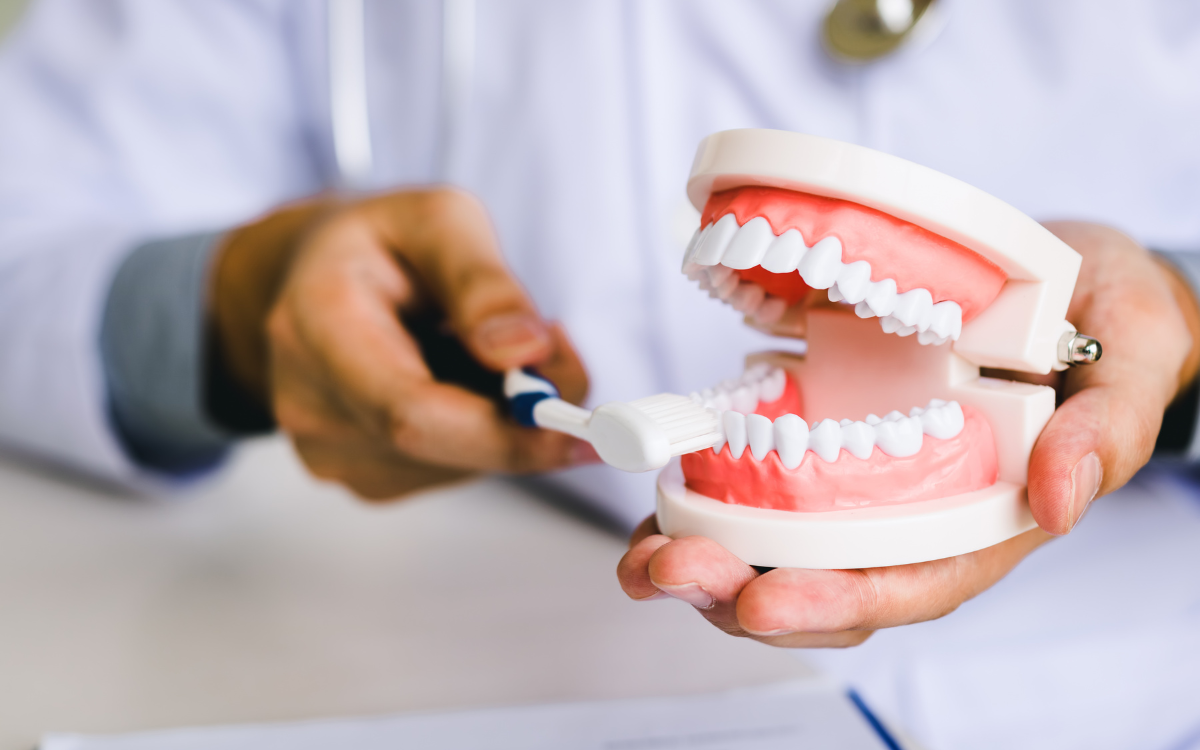Guide to Oral Hygiene: The Secret to a Healthy Smile
By Joy Nieh, MA
Clinically reviewed by Gain Lu, DDS

Why Oral Hygiene Is So Important
Have you ever had a horrible toothache? You’re not the only one. More than 40% of adults report having oral pain in the past year, and 80% of people have at least one cavity by the time they’re 34.1 Having good oral hygiene is a great way to take care of not only your oral health but also your whole body.
It may feel annoying to remember to brush your teeth before going to work, or after a long day; or to remember flossing every single tooth before you go to bed. However, if you have poor oral hygiene, you can develop cavities, which are holes in the teeth, or get painful gum infections. With these dental problems, it’s common to have toothaches that affect the way you eat and talk. Taking care of your personal oral health at home is more affordable than going to the dentist. It can save you time, money, and worry in the long run.1
Beyond just your teeth, your mouth is key in the digestive and respiratory systems (2). Poor oral health could lead to whole body medical issues and disease.2 For example, gum disease can contribute to heart disease, stroke, pneumonia, and even pregnancy complications.1
Also, oral health affects you if you have a chronic disease. People with arthritis, diabetes, or heart disease are at greater risk for poor oral health.3
Luckily, there are simple ways to improve your oral health, effectively preventing oral disease and cavities. The best oral hygiene routine starts with simply a toothbrush, toothpaste, and floss.
Brushing Your Teeth the Right Way
When you think of oral hygiene, the first thing you think of is brushing your teeth. But are you brushing the right way?
Brushing your teeth at least twice a day removes plaque, a film of bacteria that coats your teeth, and the food particles that may cause cavities. Remember 2 minutes, 2 times a day.5 Make sure to use toothpaste with fluoride, which helps prevent tooth decay by making the surface of our teeth (enamel) stronger, and more resistant to cavities.
Here are the steps to brushing your teeth the right way:
- Step 1. Put your soft bristled toothbrush against your gums at a 45-degree angle. Move the brush back and forth gently and in short strokes, about as wide as each of your teeth.
- Step 2. Brush the outer tooth surfaces.
- Step 3. Brush the inner tooth surfaces.
- Step 4. Brush the chewing surfaces.
- Step 5. Use the top part of the brush to clean the inside surface of the top and bottom front teeth. Use a gentle up-and-down motion.
- Step 6. Brush your tongue, which may help remove bacteria and freshen your breath.
Flossing Your Teeth the Right Way
Flossing removes plaque and food particles between teeth and at the gum line. Brushing can miss these spots, so flossing helps prevent gum diseases. It can even help reduce bad breath.4 Make sure to floss at least once a day, optimally BEFORE brushing your teeth, to remove food, debris, and plaque between the teeth.8
- Step 1. Break off at least 12 inches (or 30 cm) of floss. Wrap one end of the string around a finger of one hand.
- Step 2. Wrap the other end of the string around the same finger on the other hand. Press your thumbs against that finger to hold the floss tightly.
- Step 3. Guide the floss between the teeth using a gentle up and down motion towards the gums. When the floss reaches the gum line, curve it against one tooth.
- Step 4. Gently move the string back up and down against the tooth. Then gently move the floss away from the gum and out of the teeth.
- Repeat the process for all teeth.
Don’t Skip the Dentist—Visit Every 6 Months for Healthy Teeth
Even if you brush and floss every day, there will be spots you can’t clean without a professional dental cleaning. A dentist will be able to examine your teeth for early signs of issues. They can check for cancers, cavities, and oral health issues even if you wear dentures or have lost most or even all of your teeth.3
Oral hygiene is preventative health care, and preventative care is much more affordable than emergency or restorative procedures. It is best to address oral health issues before they escalate to an emergency, which can be stressful and get in the way of your daily life.
Get Help with Dental Care at Charles B. Wang Community Health Center
Our experienced and skilled dental care professionals take the time to listen to each patient's concerns and tailor treatment plans to help every patient achieve a beautiful and healthy smile. Charles B. Wang Community Health Center offers a wide range of services to meet your dental needs, including general dentistry, teeth cleaning, dental x-rays, dental fillings and crowns, tooth extraction, root canals, basic periodontal treatment, denture and bridge care. Even if you haven’t seen a dentist in years, the Charles B. Wang Community Health Center can provide compassionate, affordable, and comprehensive dental services.
At the Charles B. Wang Community Health Center, we believe that everyone deserves access to high-quality dental care, and we strive to make it accessible to all. We accept a variety of insurances and use a sliding fee discount for out-of-pocket payments. Our recently built dental suites offer state-of-the-art facilities equipped with the technology and equipment to provide the highest quality dental care in two convenient locations in Flushing, Queens and Lower Manhattan. Our multilingual dental staff speak over 12 languages including Mandarin Chinese, Cantonese, Korean, and Spanish.
Learn more about our dentists and dental hygienists to find the right provider for you. You can also call our dental offices to learn more about our services or schedule an appointment:
- Dental (Manhattan): (212) 226-9339
- Dental (Queens): (718) 587-1111
We’re here to help you and your family stay healthy and smiling.
FAQ
1. I’m not having any symptoms. Do I still need to visit the dentist?
Yes, even if you don’t have any symptoms, there can be dental issues only a dentist can diagnose. Visiting your dentist regularly (every 6 months) can also prevent problems from developing. Continuity of care is an essential part of any health plan and that applies to dental health as well.6
2. What kind of toothbrush should I use?
You can use either an electric or a manual toothbrush. It is more important to thoroughly brush your teeth 2 times a day. Remember, 2 minutes, 2 times a day. Remember to replace your toothbrush every 3 to 4 months, earlier if it frays.5
3. What kind of floss should I use?
You can choose between a variety of options including traditional dental floss, dental picks, tiny brushes, water flossers, and interdental brushes. Resist the urge to use toothpicks, nails or your hair as a substitute. It can damage your gums and lead to an infection.8
4. Do I need dental insurance to be seen?
No, at the Charles B Wang Community Health Center, we provide care to everyone regardless of ability to pay or health insurance status. We can help you enroll in health insurance plans such as Medicaid if you are eligible. We also use a sliding fee discount for those who qualify.
Sources
- https://my.clevelandclinic.org/health/treatments/16914-oral-hygiene
- https://www.mayoclinic.org/healthy-lifestyle/adult-health/in-depth/dental/art-20047475
- https://www.cdc.gov/oral-health/prevention/oral-health-tips-for-adults.html
- https://www.nhs.uk/live-well/healthy-teeth-and-gums/how-to-keep-your-teeth-clean/
- https://www.mouthhealthy.org/all-topics-a-z/toothbrushes
- https://www.mouthhealthy.org/dental-care/questions-about-going-to-the-dentist
- https://www.mouthhealthy.org/all-topics-a-z/brushing-your-teeth
- https://www.mouthhealthy.org/all-topics-a-z/flossing
Heading
Lorem ipsum dolor sit amet, consectetur adipiscing elit. Suspendisse varius enim in eros elementum tristique. Duis cursus, mi quis viverra ornare, eros dolor interdum nulla, ut commodo diam libero vitae erat.


Heading
Lorem ipsum dolor sit amet, consectetur adipiscing elit. Suspendisse varius enim in eros elementum tristique. Duis cursus, mi quis viverra ornare, eros dolor interdum nulla, ut commodo diam libero vitae erat.
The Charles B. Wang Community Health Center is a nonprofit and federally qualified health center offering comprehensive primary care services to all in six convenient locations in Manhattan and Queens seven days a week.








